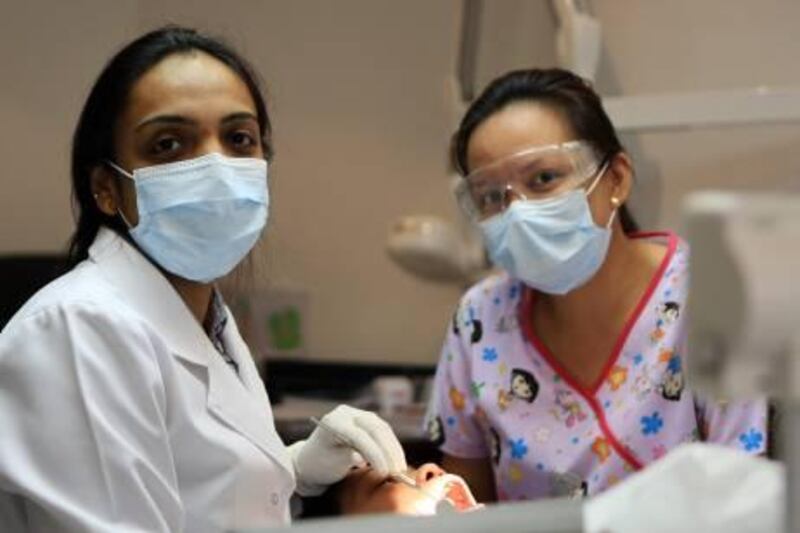ABU DHABI // Dentists are treating babies as young as one year old in an epidemic of tooth decay caused by poor dental hygiene and bad diet.
Practitioners now fear that children are in danger of losing their permanent teeth, which begin developing when a child is 6.
"We call it 'baby bottle syndrome', which is when the children have been given sweet milk at night in their bottle. The front teeth just dissolve or are in really bad shape," said Dr Asmat Lone, a dentist in the capital.
"But we are more worried about decay in children's permanent teeth. These teeth are going to be with them for the rest of their lives, so if a child who is 6 or 7 has permanent damage to their molars, it is going to be a disaster.
"Normally, the young ones come to the dentist when they are in pain, and by that time it is too late," Dr Lone said.
"The decay has already reached the nerve. This is why I suggest kids go to the dentist once every six months, or to the school dentist."
A survey last summer of nearly 26,000 schoolchildren in Abu Dhabi, Al Ain and Al Gharbia by Seha, the Abu Dhabi health services company, revealed that two-thirds had tooth decay.
Dr Smitha Ninan, who runs the Taj Dental Centre, said education should begin long before children start school. "A very important factor is that most parents ignore routine dental visits."
Almost 90 per cent of parents bring in their children only when they are in pain, which can leave a lasting negative impression. "It wouldn't be fair to take a young child to the dentist for the first time to get a tooth pulled out," Dr Ninan said.
Proper dental hygiene needs to be introduced when children are young to prevent problems, Dr Lone said.
"Flossing is extremely important. What a brush can do, your tongue can do, but your tongue cannot go through your teeth. Only floss can go there."
Parents should give their children floss picks to make it a habit early in life, and they should be taught a proper brushing technique.
Schools, families and health authorities must all work together to remedy the problem, said Dr Adil Hamed Alani, an endodontist at Tawam Hospital's dental centre.
"Most people here depend on their dentist. This is a bad thing."
Dr Ninan suggested environmental factors were also an issue. "In the Northern Emirates the water has a fluoride level which is slightly on the high side," she said. Ingesting too much fluoride at a young age can lead to a weakening of the enamel, discolouration and, eventually, tooth decay.
More dental hygienists and education specialists are also needed, doctors said. In addition, parents should control what food and drink their children consume.
"When I talk with parents, they say they cannot control their children, but I feel that this is not an excuse," Dr Alani said.
Dr Ninan agreed that a poor diet was detrimental to tooth health. "Kids are so absorbed with having refined food so basically no chewing is happening," she said.
Dr Lone said although it might be difficult for some parents to completely ban unhealthy food and drink, teaching the basics of brushing would go some way to reversing the situation. But people should not assume that the correct amount of brushing and flossing would undo the effects of an unhealthy diet.
"Sweets and crisps are all carbohydrates, and carbohydrates will lower the pH of saliva. Once the pH of saliva is lowered, more acid will be created in your mouth, and this acid is going to dissolve your tooth."
Abu Dhabi Education Council has made strides to prevent children from eating unhealthy food, issuing new guidelines for school canteens several months ago.
Schools "have a health service", Dr Lone said. "They should strengthen this service and try to get to every child. This would be a real investment for the future."
[ zalhassani@thenational.ae ]





